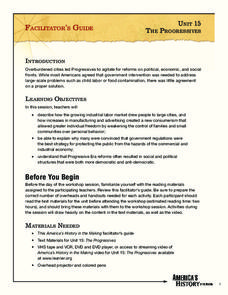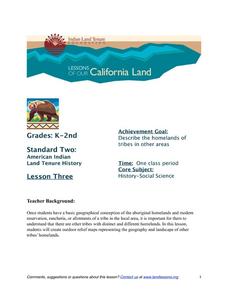K5 Learning
Mixed Practice Word Problems #12
Five questions make up a mixed practice worksheet consisting of word problems that cover subtraction, multiplication, pounds, and distance.
Chicago Botanic Garden
Are All Plants Created Equal?
Photosynthesis requires energy and produces food, and cellular respiration produces energy and requires food. An interesting lesson analyzes the factors that affect the rates of photosynthesis and respiration. Classes spend one day...
Curated OER
Animal Science as Agriculture
The methods by which farming and agriculture became a valid area of study and research are detailed in this PowerPoint. Also presented are the steps involved for improving productivity and efficiency. The use of scientific method and...
Curated OER
Healthy Body Image: A Lesson Plan for High School Students
How does your class view themselves? High schoolers explore body image through a series of four activities. Groups collaborate to examine the changes we experience as a part of growing up, how the media influences body image, and healthy...
School Improvement in Maryland
Regulatory Agency
Five governmental regulatory agencies are tasked to respond to market failure. Groups investigate the roles of each of these agencies as well as the social, economic, and political impact of their actions.
NOAA
Through Robot Eyes
How do robots assist ocean explorers in collecting data and images? The final installment in a five-part series has science scholars examine underwater images collected by robots and identify the organisms shown. Groups then calculate...
National Wildlife Federation
What's Your Habitat?
How are third graders like rabbits? They both live in habitats and require food, water, and shelter to survive! An educational science lesson encourages your learners to think about their own habitats and survival needs, before comparing...
Howard Hughes Medical Institute
Lactose Intolerance: Fact or Fiction
Around the world, about 2/3 of adult humans are lactose intolerant. Scholars work in small groups to discuss a few statements about lactose intolerance. Then, they watch a video on the topic and readdress each statement. Whole-class...
Curated OER
Plankton in the Air
Here is a lab activity adequate for use with any full lesson on environmental factors that shape animal adaptations or marine animal characteristics. Pupils will discuss the role plankton plays in the environment and filter-feeding...
NOAA
Ocean Zones
How can organisms light up in water? Bioluminescence is light produced in a chemical reaction that can occur in an organism's body. First, learners determine what happens to light/color as you move into the deep ocean. In groups, they...
Annenberg Foundation
The Progressives
The Progressive Era brought about a word that often leads to turmoil—change! Learners research the late 1800s in American history to uncover societal issues gripping the nation back in the day. The 15th lesson of a 22-part series...
Federal Trade Commission
Ad Creation
How would someone market a new cereal to space aliens? Using the third lesson from a four-part Admongo series on advertising, pupils learn about persuasive techniques companies use to convince consumers to purchase their products. As a...
Macmillan Education
Cultural Awareness
The importance of cultural awareness, of becoming aware of our own and other cultures, and the benefits of gaining a deeper understanding of the differences between cultures, is the focus of this resource. Working individually, in pairs,...
Indian Land Tenure Foundation
More Tribal Homelands
Here is a very fun idea that introduces young learners to how geographical location affects cultural development. They are introduced to four areas where Native Americans have lived in the past by reading stories and examining images....
EduGAINs
Consumerism, Me and the Natural Environment— Canadian and World Studies
Just as no man is an island, no country is totally independent of other countries. To understand the impact of individual consumer decisions on the global natural environment, class groups consider how the stuff they purchase connects to...
Polar Trec
Plankton Parents
Plankton are so abundant in the ocean they outweigh all of the animals in the sea. In this three day activity, groups discuss and become familiar with plankton, capture females, and look for egg production on day three.
DiscoverE
Sorting Solutions
It's okay to play with your food—just this once! Scholars design and create meshes and chutes to sort pasta by size and shape. They test their designs and make improvements as necessary.
Curated OER
Be That As It Maya
Creative projects are a great way to engage your class and can be a fun way to assess mastery! Learners create brochures and postcards that might have been created by and for travelers to ancient Mayan cities. They read and discuss the...
Wild BC
Is Climate Change Good for Us?
Is it really that big of a deal if the global climate undergoes a little change? Young environmentalists consider this very question as they discuss in small groups the impact of different climate change scenarios on their lives, their...
Council for the Curriculum, Examinations and Assessment
Health and the Whole Person
Health is more than measuring your blood pressure and eating nutritious foods. Eighth graders discuss the factors that play into an individual's health, including spirituality, social life and friendships, emotional stability, cognitive...
K5 Learning
Mouse Madness
Reinforce reading comprehension skills with a practice page that challenges scholars to read a passage called, Mouse Madness, then prove their comprehension by way of five short answer questions.
American Statistical Association
Step into Statastics
Class members study the size of classmates' feet and perform a statistical analysis of their data. They solve for central tendencies, quartiles, and spread for the entire group as well as subgroups. They then write a conclusion based on...
Houghton Mifflin Harcourt
Amazing Animals: Challenge Activities (Theme 4)
For kids who have already mastered the basic concepts in the Houghton Mifflin Harcourt thematic units on amazing animals, here's a packet of enrichment activities sure to provide food for fertile minds.
Curated OER
What Are You Eating?
Discover the calorie content of foods by observing how much heat they produce in water. If you have a calculator-based laboratory (CBL™) insturment for collecting data, then this laboratory worksheet will not need any changes. If not,...

























